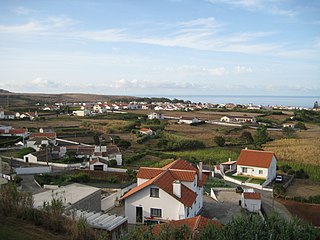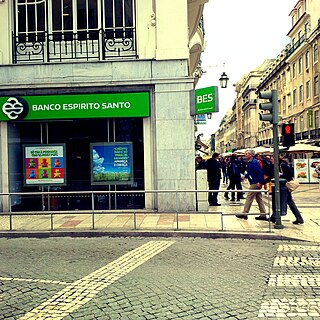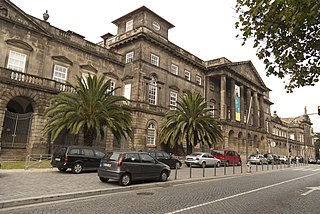
Vila do Porto is the single municipality, the name of the main town and one of the civil parishes on the island of Santa Maria, in the Portuguese archipelago of Azores. Its nearest neighbor, administratively, is the municipality of Povoação on the southern coast of São Miguel, and it is physically southwest of the islets of the Formigas. The population in 2021 was 5,408, in an area of 96.89 km2 (37.41 sq mi).

Banco Espírito Santo (BES) was a Portuguese bank based in Lisbon that on 4 August 2014 was split in two banks: Novo Banco, which kept its healthy operations, and a "bad bank" to keep its toxic assets.

Tranquilidade is a Portuguese insurance company, founded in Porto in 1871. It is a subsidiary of Italian insurance group Generali Italia.

The National Bank of Angola is the central bank of Angola. It is state-owned and the Government of Angola is the sole shareholder. The bank is based in Luanda, and was created in 1926, but traces its ancestry back to 1865. The National Bank of Angola is active in developing financial inclusion policy and is a member of the Alliance for Financial Inclusion.
Access to at least basic water increased from 94% to 97% between 2000 and 2015; an increase in access to at least basic sanitation from 73% to 86% in the same period;

Healthcare in Portugal is provided through three coexisting systems: the National Health Service, special social health insurance schemes for certain professions and voluntary private health insurance. The SNS provides universal coverage, although in 2012 measures were implemented to ensure the sustainability of the service by the introduction of user fees to be paid for at the end of treatments. In addition, about 25% of the population is covered by the health subsystems, 10% by private insurance schemes and another 7% by mutual funds. The Ministry of Health is responsible for developing health policy as well as managing the SNS. The Health Regulatory Entity (ERS) is the public independent entity responsible for the regulation of the activity of all the public, private and social healthcare providers. In 2019 the government proposes to scrap all fees, which constitute about 2 percent of the NHS's budget, apart from some hospital emergencies.

Manuel António Gomes de Almeida de Pinho is a former Portuguese Minister of Economy and Innovation (2005–09) in the José Sócrates cabinet, who subsequently became an energy policy academic (2010–17) under circumstances that led to indictments in Portugal in 2017 and 2019, to house arrest since 2021, and to multiple charges of passive corruption, tax fraud, and money laundering in 2022. According to those charges, Pinho received, while in office, at least 4.5 million euros in secret monthly offshore payments from his prior and subsequent boss Ricardo Espírito Santo Salgado whose Espírito Santo Financial Group benefited from several of Pinho's decisions as minister.
Banco Best, also known as Best Bank, is a private financial institution founded in 2001 and registered with the Bank of Portugal and the Portuguese Securities Market Commission (CMVM).

The Banco de Portugal is the Portuguese member of the Eurosystem and has been the monetary authority for Portugal from 1846 to 1998, issuing the Portuguese escudo. Since 2014, it has also been Portugal's national competent authority within European Banking Supervision. The bank was founded by royal charter in 1846, during the reign of Queen Maria II of Portugal, by a merger of the Banco de Lisboa, the first bank founded in Portugal, and insurer Companhia Confiança Nacional.

Carlos da Silva Costa is a Portuguese economist who served as Governor of the Bank of Portugal from June 7, 2010 to July 20, 2020, when he was succeeded by Mário Centeno.

BRB Banco de BrasíliaS.A, more commonly referred to as BRB or Banco de Brasília, is a state owned Brazilian bank that is controlled by the government of the Federal District. The Bank offers a range of financial products and services, including saving accounts, credit cards, investment services, insurance and loans, among others. The Bank has both individual and corporate customers. The Company is part of the BRB group, comprising Cartão BRB, Seguros BRB, Financeira Brasília, BRB DTVM, BRB Saude, Regius and BRB Mobilidade. BRB was founded in 1983 and is headquartered in Brasília, DF. BRB is listed in the B3 stock exchange in São Paulo.

Álvaro de Oliveira Madaleno Sobrinho is an Angolan banker and businessman that developed his career in Portugal. He rose to prominence as director of Portuguese bank Banco Espírito Santo which collapsed in 2014.

José Maria Ricciardi is a Portuguese economist and banker.

Ricardo Espírito Santo Silva Salgado is a Portuguese economist and convicted banker. President of Banco Espírito Santo, which was founded by his grandfather, he was, until July 2014, the banker active for the longest time in Portugal.
Vítor Augusto Brinquete Bento is a Portuguese banker. He was the CEO of the Portuguese bank Novo Banco since August 4, 2014 until September 13, 2014, when he announced his resignation. He was replaced by Eduardo Stock da Cunha.
novobanco is a financial institution, based in Portugal that stands out as one of the country's main commercial banks. It was established on 4 August 2014, as a result of a restructuring and recapitalisation process by the Bank of Portugal to rescue assets and liabilities of Banco Espírito Santo (BES). BES was the second largest private financial institution in Portugal in terms of net assets, as well as one of the oldest and most reputed Portuguese banks.
The following lists events that happened during 2014 in Luxembourg.

Banco Económico, formerly Banco Espírito Santo Angola (BESA) renamed in 2015, after the bankruptcy of its mother house in Portugal, Banco Espírito Santo (BES), is an Angolan bank based in Luanda. Previously, BESA was affiliated with the now defunct Banco Espírito Santo, now Novo Banco, and is therefore a subsidiary of Espírito Santo Financial Group (ESFG).

Ricardo Espírito Santo (1900–1955) was a Portuguese banker, economist, patron of the arts, and international athlete. A good friend of the Portuguese dictator, António de Oliveira Salazar, he turned the Banco Espírito Santo (BES) into one of the most important financial institutions in Portugal.
On August 7, 2008, the Campolide branch of the Banco Espírito Santo in Lisbon was held up in a robbery attempt.













